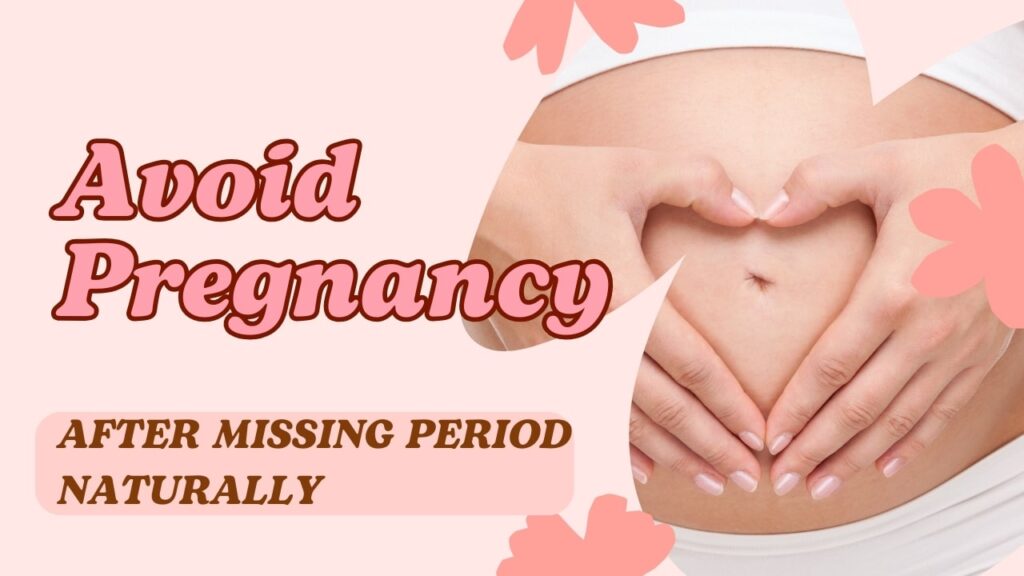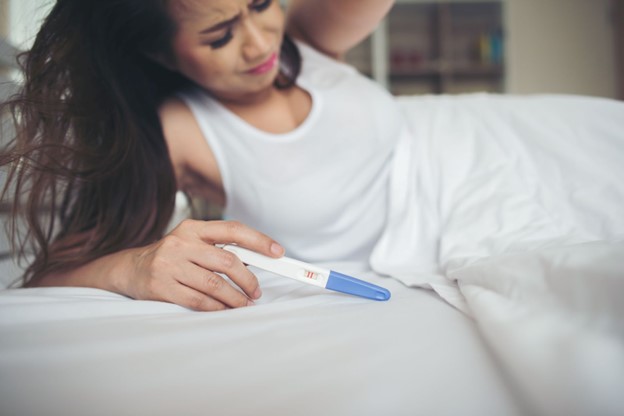Last updated on May 21st, 2025 at 01:26 pm
 Facing the possibility of an unintended pregnancy can be a daunting experience, especially after missing a period. While there are several contraceptive methods available, many individuals may prefer to explore natural options for avoiding pregnancy. Avoiding pregnancy after missing a period naturally involves several strategies centered around understanding and tracking one’s menstrual cycle. One effective approach is to monitor changes in basal body temperature (BBT) and cervical mucus consistency, which can indicate fertile days. By abstaining from intercourse or using barrier methods during these fertile windows, the risk of pregnancy can be minimized.
Facing the possibility of an unintended pregnancy can be a daunting experience, especially after missing a period. While there are several contraceptive methods available, many individuals may prefer to explore natural options for avoiding pregnancy. Avoiding pregnancy after missing a period naturally involves several strategies centered around understanding and tracking one’s menstrual cycle. One effective approach is to monitor changes in basal body temperature (BBT) and cervical mucus consistency, which can indicate fertile days. By abstaining from intercourse or using barrier methods during these fertile windows, the risk of pregnancy can be minimized.
Additionally, tracking menstrual cycles through calendar methods can help predict ovulation and inform decisions about when to engage in sexual activity. While these natural methods can be reliable when practiced consistently, it’s essential to recognize their limitations and consider consulting a healthcare provider for personalized advice and additional contraceptive options.

Understanding the Menstrual Cycle
Before delving into natural methods of avoiding pregnancy, it’s essential to understand the menstrual cycle. The menstrual cycle spans approximately 28 days on average, although individual variations exist. It encompasses distinct phases: menstruation, the follicular phase, ovulation, and the luteal phase, each contributing to the intricate rhythm of the reproductive system.
Ovulation, which typically occurs around the middle of the menstrual cycle, is the release of an egg from the ovary. This is the most fertile time in the menstrual cycle, as the egg is viable for fertilization for about 12-24 hours after release. Sperm can survive in the female reproductive tract for up to five days, so having intercourse in the days leading up to ovulation can result in pregnancy.
How To Avoid Pregnancy After Missing Period Naturally
Avoiding pregnancy after a missed period can be a concerning situation for many individuals. While there are several contraceptive methods available, including emergency contraception, some people may prefer to explore natural options. It’s crucial to note that natural methods may not be as reliable as medical contraception, and their effectiveness can vary from person to person. However, here are some strategies that individuals may consider:
1. Emergency Contraception (Plan B)

If you’ve had unprotected intercourse and are worried about pregnancy after a missed period, emergency contraception can be an option. Plan B, also known as the morning-after pill, is available over the counter at pharmacies in many countries. Its mechanism entails inhibiting or postponing ovulation, thus diminishing the likelihood of fertilization occurring. It’s most effective when taken within 72 hours (three days) after unprotected intercourse, although it may still be somewhat effective up to 120 hours (five days) later. It’s essential to follow the instructions carefully and consult a healthcare provider if you have any concerns.
2. Tracking Fertility Signs
Monitoring your fertility signs can help you identify fertile and non-fertile days in your menstrual cycle. This includes tracking changes in cervical mucus, basal body temperature (BBT), and using fertility awareness methods (FAM). By abstaining from unprotected intercourse during fertile days, you can reduce the risk of pregnancy. However, it’s important to note that these methods require consistency, awareness, and education to be effective.
3. Avoiding Unprotected Intercourse
One of the most straightforward ways to avoid pregnancy after a missed period is to abstain from unprotected intercourse until you are sure about your pregnancy status or until you’re ready for pregnancy. This may involve using barrier methods such as condoms or other forms of contraception consistently and correctly.
4. Healthy Lifestyle Choices
While not a direct method of contraception, maintaining a healthy lifestyle can support reproductive health and potentially reduce the likelihood of pregnancy. This includes eating a balanced diet, exercising regularly, managing stress, getting enough sleep, and avoiding harmful substances like tobacco, alcohol, and recreational drugs. While these lifestyle factors may not directly prevent pregnancy, they contribute to overall well-being, which can positively impact fertility and reproductive health.
5. Herbal Remedies and Supplements
Some people explore herbal remedies and supplements as a way to support contraception naturally. While scientific evidence for their effectiveness is limited, herbs like dong quai, wild yam, and chasteberry have been traditionally used for their purported contraceptive properties. However, it’s essential to approach herbal remedies with caution and consult with a healthcare provider before using them, as they may interact with medications or have adverse effects.
6. Seeking Professional Guidance
If you’re unsure about how to proceed after missing a period and want to avoid pregnancy, it’s crucial to seek guidance from a healthcare provider. They can provide personalized advice, discuss contraceptive options, and address any concerns you may have. They can also offer pregnancy testing, counseling, and support services to help you make informed decisions about your reproductive health.
While there are natural methods and strategies that individuals may consider to avoid pregnancy after a missed period, it’s important to remember that none of these methods are foolproof. Emergency contraception, tracking fertility signs, avoiding unprotected intercourse, maintaining a healthy lifestyle, exploring herbal remedies cautiously, and seeking professional guidance are all options to consider based on individual preferences and circumstances. Ultimately, choosing the most suitable contraceptive approach involves careful consideration, education, and communication with healthcare providers.
Natural Methods to Avoid Pregnancy
- Temperature Charting: Basal Body Temperature (BBT) charting involves taking your temperature every morning before getting out of bed. Your BBT tends to rise slightly after ovulation due to increased progesterone levels. Tracking these temperature changes can help identify when ovulation has occurred, allowing you to avoid unprotected intercourse during fertile days.
- Cervical Mucus Monitoring: The consistency and appearance of cervical mucus change throughout the menstrual cycle. During the time of ovulation, cervical mucus undergoes a transformation, adopting a transparent, slick, and elastic consistency akin to the texture of raw egg whites. Monitoring these changes can help predict ovulation and avoid unprotected intercourse during fertile days.
- Withdrawal Method (Coitus Interruptus): While not the most reliable method, the withdrawal method involves withdrawing the penis from the vagina before ejaculation. This method requires precise timing and control and may not be effective in preventing pregnancy due to pre-ejaculate containing sperm.
- Abstinence: The most foolproof way to avoid pregnancy is abstinence from sexual intercourse. While it may not be the preferred option for everyone, it ensures zero risk of pregnancy.
- Fertility Awareness-Based Methods (FAM): Fertility awareness methods involve combining various natural indicators of fertility, such as BBT, cervical mucus, and calendar tracking, to identify fertile days and avoid unprotected intercourse during those times.
Conclusion
While natural methods of contraception can be appealing to some individuals, it’s essential to recognize their limitations and effectiveness. None of these methods provide 100% protection against pregnancy, and they require diligence, consistency, and awareness of one’s body and menstrual cycle. For those seeking reliable contraception, consulting with a healthcare provider to explore other contraceptive options may be advisable. Additionally, it’s crucial to remember that sexually transmitted infections (STIs) cannot be prevented through natural contraception methods, so using barrier methods like condoms is essential for STI protection. Ultimately, the choice of contraception should be based on individual preferences, lifestyle, and healthcare provider recommendations.
FAQs on How to Avoid Pregnancy After Missing Period Naturally
1. Is it possible to avoid pregnancy naturally after missing a period?
Answer: Yes, it is possible to employ natural methods to reduce the risk of pregnancy after missing a period. These methods typically involve tracking your menstrual cycle and avoiding intercourse during fertile days.
2. What are some natural methods to prevent pregnancy after a missed period?
Answer: Natural methods include tracking menstrual cycles, monitoring basal body temperature (BBT), observing changes in cervical mucus consistency, and practicing abstinence or using withdrawal methods during fertile windows.
3. How effective are natural methods in preventing pregnancy after a missed period?
Answer: The effectiveness of natural methods varies. While they can be reliable when practiced consistently and correctly, they may not offer the same level of protection as other contraceptive methods. It’s essential to understand their limitations and consider consulting a healthcare provider for personalized advice.
4. Are there any risks associated with relying on natural methods after a missed period?
Answer: While natural methods are generally considered safe, there is a risk of unintended pregnancy if these methods are not followed meticulously. Additionally, natural methods do not protect against sexually transmitted infections (STIs), so it’s crucial to consider using barrier methods like condoms for STI prevention.
Also Read:-
- Best Creams for fungal infection in private area – Buy Fungal Infection Creams Online
- When Should I Start Using A Pregnancy Pillow? – How to Use a Pregnancy Pillow
- First-Time Sex: Can it lead to pregnancy? | Pregnancy Chances for Teens and Adults
- Pregnancy Test Kit | Pregnancy Test Instructions Manual